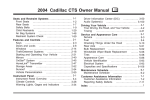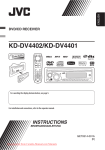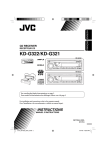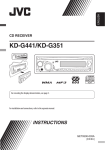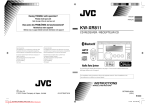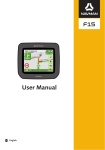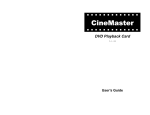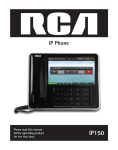Download Pontiac Vibe Navigation System Supplement User's Manual
Transcript
The 2003 Pontiac Vibe Navigation System Supplement This supplement contains information on the operation of the Navigation System in your vehicle. This supplement, along with your owner’s manual, will assist you in the proper use of the system. If you have any problems using the system, please contact your dealer. 1-1 Overview Here the supplement gives you basic information that you will need to know to be able to operate your Navigation System. 2-1 Features This section shows the different features available on your Navigation System. 3-1 Navigation Audio System This section explains how to use the audio system included with your Navigation System. 4-1 If a Problem Occurs This section explains what to do if you experience a problem with the Navigation System. Litho in U.S.A. Part Number 10325530 A First Edition ECopyright General Motors Corporation 01/07/02 All Rights Reserved i GENERAL MOTORS, GM, the GM Emblem, PONTIAC, and the PONTIAC Emblem are registered trademarks and the name VIBE is a trademark of General Motors Corporation. This manual includes the latest information at the time it was printed. We reserve the right to make changes in the product after that time without notice. ii Please keep this supplement with the owner’s manual in your vehicle, so it will be there if you ever need it while you’re on the road. If you sell your vehicle, leave the owner’s manual supplement and the owner’s manual with the vehicle. Section 1 Overview Here you’ll find basic information about the features of your Navigation System and how they are used. 1-2 1-3 1-4 Introduction Global Positioning System (GPS) Maps 1-5 1-8 1-10 Using the Navigation System Screen Setup Adjust Clock 1- 1-1 Introduction S–29–0023–3 Before you begin to operate this system, read this manual thoroughly to become familiar with it and to understand how the system works. The Navigation System allows you to do the following: D Plan a route with provided turn-by-turn route and map guidance with voice prompts. D Select a destination from various areas and choices (i.e. street addresses, intersections, marked points, points of interest, etc.). D Receive broadcast announcements on traffic and emergency alert communications. The information in the system may not always be complete. Road conditions, such as prohibited turns, detours and construction zones, change frequently. It is important to consider whether you can follow the directions given by the system for the current conditions. 1-2 Global Positioning System (GPS) The Navigation System determines the position of your vehicle by using satellite signals, various vehicle signals and map data. The Global Positioning System (GPS) locates the current position of your vehicle using signals sent by the United States Department of Defense GPS Satellites. While your vehicle is receiving signals from the satellites, GPS will appear on the map screen. However, at times, other interferences such as the satellite condition, road configuration, the condition of the vehicle and/or other circumstances can interfere with the system’s ability to determine the accurate position of the vehicle. This system may not be available or interference may occur if any of the following are true: D Signals are obstructed by tall buildings, large trucks or a tunnel. D Metallic objects are located on the dashboard. D Satellites are being repaired or improved. D Aftermarket glass tinting has been applied to the vehicle’s windshield. Do not apply aftermarket glass tinting to the vehicle’s windshield or place metallic objects on the vehicle’s dashboard. Glass tinting and metallic objects will interfere with the system’s ability to receive GPS signals and may cause the system to malfunction. If you are experiencing a problem, see “Vehicle Positioning” and “Problems with Route Guidance” in the Index for more information. 1-3 Maps This section includes basic information that you need to know about the map database. The maps are stored on a DVD-ROM. The United States (excluding Alaska and Hawaii) and portions of Canada are contained in one disc. The United States map database includes the interstate freeways, state highways, country roads and major and general streets. Refer to the “Navigation System Map Disc” manual to view the explanation of map coverage. This manual will be in your map DVD case when the vehicle is delivered from the factory. When your vehicle is delivered from the factory, the dealer may have installed the map DVD. If the DVD was not installed in your vehicle when first purchased, use the following directions to load the DVD: 1. Turn the ignition switch to ON or ACCESSORY. Once the DVD is inserted correctly, you will have the following two choices: D ENG (English) D FR (French) D I AGREE You can change the language to one of the two that are available by using the control pad located on the bottom left corner of the navigation system, to select a language and press the ENT button to choose the selection. Once a language is selected, select I AGREE to plan a route. The map will appear showing your current vehicle position. Map Adjustments The system allows you to adjust the scale of view on the map. Also, the map will scroll automatically based on the direction you are traveling. 2. If already loaded, eject the map DVD or a CD from the slot. To view a larger or smaller scale of the map, press the Zoom In or Zoom Out symbol keys. See “Zoom In/Out” later in this section for more information on these keys. 3. Load the map DVD into the slot by inserting it partway. The system will pull it in. Map Scales The scale of a map can range from 1/32 of a mile (0.05 km) to 128 miles (206 km). 1-4 Using the Navigation System This section describes the basic information you will need to know to operate the Navigation System. The navigation screen shows a number of icons that offer information on a variety of topics. Use the keys, located on each side of the navigation screen, and the control pad, located at the bottom left corner of the faceplate, to operate the system. Use the left and right arrows on the control pad to move horizontally on the screen and the up and down arrows on the control pad to move vertically on the screen. Use the ENT button in the center of the control pad to choose your desired selection. Once the vehicle is running, various functions will be disabled to reduce driver distraction. Hard Keys The following hard keys are located to the left of the navigation screen: D (Eject) D TA D D D D D D SEEK NAV BAND CD (AUDIO) SETUP Refer to the Index for more information on each of these hard keys to learn what they can do. The system also has the following reconfigureable soft keys located to the right of the navigation screen. These have hard key labels for easier understanding while in navigation mode. The six keys change functions for different modes of the system. D MAP D DEST D MENU D (Zoom In) (Zoom Out) D D BACK 1-5 These keys allow you to do the following: NV–31–0006–2 Zoom In NV–31–0005–2 Zoom Out D Press Zoom In to get a closer look at the map you are traveling on. Locate a destination easily by zooming in to see a smaller section of the map, if you are close to your destination. D Press Zoom Out to see a larger scale of the map, if the destination that you wish to reach is a long distance from your current location. You can also view your highlighted route. 1-6 Key Pad The letters, symbols and punctuation available to you are displayed on the alpha bar. The alpha bar will automatically be available whenever the system needs information from you. Make your selection by pressing the ENT button on the center of the control pad. To enter a space between the words of a name, you must use the control pad and select the space symbol, which is at the end of the keypad. To make your name selections easier, the system will only allow you to select a character which can follow the last one entered. For example, if you enter Z, you wouldn’t be allowed to follow it with T. The system will highlight the available characters and darken the unavailable characters. If you select an incorrect character, press the back space symbol button. If you are unsuccessful when inputting a name, it may need to be selected differently. It is possible that the map DVD (database) may not contain that information. See “Database Coverage Explanations” in the Index. This symbol will appear on the map after a route has been planned showing your destination. Numeric Bar The numbers available to you are displayed. The numerals will automatically be available whenever the system needs you to input a phone number or house address. You can cycle through the list using the control pad and make your selections by pressing the ENT button on the center of the control pad. S–29–1016–3 See “Destination (DEST)” in the Index for information on planning a route. Symbols The following symbols are the most common that appear on a map screen. Your vehicle is shown as this symbol. It indicates the current position of your vehicle on the map. When one of five possible destinations has been set, you will see a circle with the number, 1-5, of which destination it is. S–29–1015–3 1-7 This symbol indicates the map with North up. Screen Setup S–29–0001–3 S–29–1017–3 Regardless of the direction of vehicle travel, North is always up on the screen. This symbol indicates the map with the vehicle travel direction up. S–29–1018–3 The shaded triangle indicates North. By selecting map orient while on the map screen, you can see your vehicle always traveling in an up direction on the screen even though you are not traveling North. 1-8 Press the SETUP hard key, located on the left side of the navigation screen, to access the Setup Menu. The Setup Menu allows you to adjust such things as screen colors, and language of the display for the Navigation System. Day and Night Screen Changes Volume When the headlamp switch is turned on, the screen will change to a lighter background for better viewing in the daytime. At night, the screen will go to a darker background. To adjust the volume of the voice prompts you receive from the system, select Volume after pressing the MENU key. Use the control pad to raise or lower the volume. The voice prompt will come on with each adjustment to give you an idea of the volume at each level. You can also select day or night mode regardless of the lighting conditions. The Day setting leaves the system in the day mode. The Night setting leaves the system in the night mode. Brightness Once you have reached the volume level you desire, press the center of the control pad to set the volume and press the Back key to return to the previous screen. To adjust the brightness, press the SETUP hard key and then choose the option you wish to adjust by pressing the key beside it. Use the control pad to raise or lower the brightness to the desired level. You will see the screen change as you adjust the brightness. 1-9 Adjust Clock S–29–0020–3 OK: Allows you to set your selections. Hours/Minutes: To change the time on the clock press the Adjust button and use the control pad to change the time. Press the ENT button when the desired time is reached. 12Hr/24Hr: This feature allows you to decide whether the time is displayed in standard or military time. Use the control pad to select which one is desired. Once you have the time set, you must hit the OK key to save your changes and return to the Setup Menu. If you hit the BACK key, you will still return to the Setup Menu, but none of your changes will be saved. Auto GPS Update: This key sets the Navigation System’s time to match the current GPS time. The time will be updated with the GPS time when the ignition is turned to ACC or ON. To adjust the time displayed at the lower right corner of the navigation screen, select the Adjust Clock option from the Setup Menu. 1-10 Daylight Savings: Use the control pad to toggle between Daylight Savings Time On or Off. Time Zone: This menu allows you to choose from four different time zones: Pacific, Mountain, Central and Eastern. Use the control pad to scroll through the zones. When you have reached the desired zone, press the ENT button on the center of the control pad to select it. Calendar S–29–1013–3 Maintenance Information This system had a function which informs you of the time to replace certain parts of components on your vehicle. When the navigation system begins to operate and the vehicle has reached either the information item’s replacement date or the appropriate driving distance, the Information screen will automatically be displayed. You can turn off the Information screen by selecting “Do not display this message again.” To access this screen, press the SETUP key and select the Maintenance button to display the Maintenance screen. Select your desired icon from the screen and input the next maintenance date and driving distance until the next check. To access the calendar function, press the SETUP hardkey to get to the setup screen. Press the Calendar button to display the Calender screen. Here you can input memos or information for important dates. 1-11 S–29–1014–3 You can also choose Set dealer from the Maintenance screen. This allows you to register your dealer’s name and address. After you enter your dealer’s name and address, the screen changes and displays the map location of the dealer. You can also edit your dealer’s name, location and phone number if you have already registered the dealer. After you select the Set dealer button on the Maintenance screen the Edit dealer screen appears. Select the Change button to edit the dealer’s information. Select the Delete dealer button on the Edit dealer screen to delete a dealer’s information all together. 1-12 Language English/Metric Units Your vehicle has been set for the English language, but you may also select French for all instructional text and voice prompts. However, names on the location map when using the navigation functions will not change. You can select either English or metric measurements to appear for distances on the map. If you wish to change the language, do the following: 1. Press the MENU button. 1. Press the Language key under the Setup Menu, a caution will display. 2. Press Setup on the menu display. 2. Use the control pad to toggle to the language you prefer. To change between English and metric measurements, do the following: 3. Choose from the measurement options listed: kilometer/meter. 3. Press the ENT button in the center of the control pad to choose a language. 4. Use the control pad to move to the measurement option you desire. Press the ENT button in the center of the control pad to choose it. 4. Select I AGREE to change the display back to the map display. 5. Press the Back key to return to the previous screen. If the language is changed from English, the menu screens will not match word-for-word as they appear in this supplement. If you accidentally set a language and you do not understand the menus, turn your engine off. Your Navigation System will turn off. You will then be able to select a different language when the system starts up again, using the control pad to select the language. 1-13 Section 2 Features and Controls Here you’ll find information about features available on your Navigation System and how to use them. 2-2 2-2 2-3 2-4 2-5 2-5 2-5 2-5 Navigation System Screen PWR/VOL (Power/Volume) Knob NAV (Navigation) Key Navigation Menu Navigation Menu Options Display Suspend Guidance Route Overview Volume 2-6 2-6 2-7 2-7 2-8 2-13 2-17 Edit Route Route Preview Setup Marked Points DEST (Destination) Points of Interest Colors on the Screen 2- 2-1 Navigation System Screen S–29–0023–3 This display screen is located in the center of your instrument panel. In this section, the hard keys, multi-function keys and menus to plan a route are explained. 2-2 PWR/VOL (Power/Volume) Knob Press the PWR/VOL knob to turn on the audio and Navigation Systems. Turn the PWR/VOL knob to increase or to decrease the volume to the audio system. Press the knob again to turn off the audio and Navigation Systems. NAV (Navigation) Key If you are in a menu and are not on the map, the first press of the NAV key, located to the left of the display screen, will take you to the map that shows the vehicle’s current position. If no route has been planned, the first press of the NAV key will show the map screen and also the following information: If a route has been planned, the first press of the NAV key will show the map screen and also display: D The number of miles/meters until you reach your destination. D The estimated time to your destination. D The highlighted destination or turn-by-turn instructions. D The north or heading up symbol in the upper To learn more about the features shown on the map screen, you can find each feature listed in the Index. D The letters GPS to show that the Global Positioning The second press of the NAV key will bring up descriptions of the multi-function keys active on the map screen. left corner. System is working. D The time. D The map scale. NAV Repeat You can press the MAP button to have the current audio navigation prompt repeated. 2-3 Navigation Menu S–29–0017–3 You will be able to choose from the following list of items on the main navigation menu: D D D D D D D D D Suspend Guidance Route Overview Map Appearance Volume DVD (DVD Information) Edit Route Route Preview Setup Marked Points These multi-function keys are also available: The main navigation menu allows you to choose from an itemized list of options or to use the multi-function keys to make adjustments to the system and plan routes. 2-4 D D D D D D MAP DEST (Destination) MENU Zoom In Zoom Out BACK Navigation Menu Options Display Volume The following are the options available from the Navigation Menu Display. This system has voice guidance prompts that provide various messages as you approach an intersection, or other points where you need to maneuver the vehicle. Suspend Guidance When this function is selected, the current navigation route will be canceled. The highlighted route will no longer be highlighted and you will no longer receive voice prompts for navigation. The map can still be viewed by pressing the MAP button. Route Overview Selecting route overview will show the map with the route highlighted. The total distance and estimated driving time are also displayed. You can adjust the volume of the voice prompts or turn off voice guidance. Press the MENU key to display the screen, and select the Volume button. The Volume screen allows you to increase or decrease the volume from 1 to 7 or if you do not need voice guidance, to select Off. If you select Adaptive volume control, the volume is turned up automatically when the vehicle speed exceeds 50 mph (80 km/hr). DVD Information Selecting DVD will display the information for the current navigation database disc. 2-5 Edit Route Route Preview This function allows you to reroute based on preferences. You can also add, reorder or delete destinations and adjust road preference settings. Selecting route preview from the MENU screen displays the map screen with the route highlighted. The total mileage traveled and drive time is also displayed. The route is traced by the vehicle icon. You can preview the route from the starting point to the destination. S–29–0015–3 S–29–0013–3 2-6 Setup Selecting this function displays the Setup menu. From the Setup menu several options may be adjusted or turned on and off. S–29–1011–3 Marked Points Selecting this function will display the Marked Points menu. This menu contains options for adding, deleting and editing marked points stored in memory. The name, location, information and icon may be edited. Five preset destinations as well as one for Home may be registered or edited. The five preset destinations and Home are the only destination selections available from the Destination entry screen while the vehicle is moving. Up to 10 areas to avoid may also be registered. 2-7 DEST (Destination) Press this key to display one of the three Destination menus. This menu will give you more ways to plan a route by entering destination points. This screen allows you to select the area to be searched for your destination. Select Change on the screen to display a map of the United States and a part of Canada divided into 11 regions. Select the area you want by using the arrows on the control pad and press the ENT button to select it. The Destination menu screen will return automatically. S–29–0027–3 S–29–1010–3 You may choose to enter a destination using one of the items from the list. Use the control pad to choose from the following destination planning options: 2-8 Marked Points Destination Entry: This option allows you to select a destination by choosing from a list of marked points on the map that were previously marked. Marked points include up to 100 saved points and five preset destinations. Selecting marked points from the Destination Entry menu allows you to select any one of the marked points as the active destination. Marked points can also be sorted by icon, date saved or alphabetically. Previous Destination Entry: This option allows you to select a destination by choosing from a list of previous destinations once entered. S–29–0004–3 S–29–0003–3 2-9 Intersection Destination Entry: This option allows you to select a destination by inputting the intersecting roads you wish to travel to. When you select Intersection from the Destination menu, the alpha bar will appear to allow you to input the name of the first street. This should bring up a list of cities that have streets with that name. Select the correct city and then the system will allow you to enter the second street. If you input a street name which does not cross the first street a message will appear “No corresponding intersections”. After you have entered the second street, the route will be calculated and a voice prompt will come on to direct you to “Proceed to the highlighted route.” S–29–0007–3 2-10 Emergency Destination Entry: This option allows you to select a destination by choosing from a list of emergency facilities. The list will vary by area. Selecting Police Station or Hospital will show a list. The order of the list can be changed to alphabetical order or order of distance. S–29–0006–3 Freeway Entrance/Exit Destination Entry: This option allows you to select a destination by entering a freeway entrance or exit point. Highway names can be entered through the alphanumeric keyboard by using the control pad. S–29–0011–3 Previous Start Point Destination Entry: This option allows you to choose to navigate to the last known start point in the most recently followed route. Home Destination Entry: This option allows you to designate home as the destination by selecting the MENU key to display the menu screen and choosing Marked points. Select Reg. home from the Marked points menu for registering your home. Map Entry: Selecting Map on the Destinations menu allows the screen to change and displays the map location of the last map and the road preference. Once you have reached the desired destination, simply press the Enter key and the route will be planned for you. You will also hear a voice prompt directing you to “Proceed to the highlighted route.” Use the Zoom Out key. See “Zoom Out” in the Index to view the entire regional map. However, when you zoom all of the way out and scroll around the map, some parts of the map will be “missing” because they are not included on the DVD. 2-11 POI (Points of Interest): This feature allows you to choose a destination from the points of interest list. See “Points of Interest” later in this section to view the list. Selecting POI from the Destinations menu brings up the Point of Interest entry menu. The POIs in the database are cross referenced between Name, Category and City Names. Name and City Names can be entered through an alphanumeric keyboard by using the control pad. S–29–0009–3 You have three ways to select a point of interest from this screen: D Type in a point of interest by name using the alpha bar. As you type in a name, the system will search for an available match to your input. Select the correct point of interest name. D Select a point of interest by choosing the Category option. Select a category from the list the system will supply. If the list of available points of interest for the category selected is still too long, you may need to enter in the name or city of the point of interest. D Select the City key and then type in the city you wish to select a point of interest from. Press the List key to see a list of cities and select the correct one from it. While inputting a point of interest or city name, the List key will become available. Press the List key to view the list of available name choices or continue to spell the name to further reduce the list of available items. Once you select the desired location, the system will show a map of the area with a symbol marking the destination. 2-12 Points of Interest The following list shows the types of facilities in the DVD database that you can choose from when using the POI options: D D D D D D D D D D D D Airport Amusement Park ATM Auto Service & Maintenance Automobile Club Bank Bus Station Business Facility Casino City Center City Hall College and University D D D D D D D D D D D D D D D D Community Center Commuter Rail Station Convention/Exhibition Center Court House Ferry Terminal Gas Station Golf Course Grocery Store Historical Monument Hospital Hotel Ice Skating Rink Library Marina Museums Park & Ride 2-13 D D D D D D D D D D D Park/Recreation Area Parking Garage Parking Lot Performing Arts Police Station Rental Car Agency Rest Area Restaurant School Shopping Ski Resort 2-14 D D D D D Sports Complex Tourist Attraction Tourist Information Train Station Winery If a right or left arrow appears to the left or right of the item name, the complete name is too long for the display. Use the left or right arrows on the control pad and the name will scroll to the end or beginning of its name. The POI for Restaurant is broken down into eight distinct categories. Select Restaurant from the POI choices. Cuisine Type will then appear as an option. Address: This method allows you to input and store an address (without a zip code) by providing the system with a house number, street name or a city. S–29–0008–3 To enter the city name, select City on the Address screen. Select Input City Name. Enter the name of the city using the alpha bar. Select the desired city name from the list the system provides. After you have entered the city name, the system will prompt you to enter the name of the street or will give you a list of street names to choose from. Enter or select the desired street name. As information is entered, the system will automatically search for available names. While inputting a name, the List key will become available. Press the List key to view the available name choices or continue to spell the name to further reduce the number of available items. Enter the house number using the numeric bar. See “Numeric Bar” in the Index for more information. The system will list the house number range that is available for the street. Enter the name of a street using the alphanumeric bar. If you did not select the city name previously, the system may prompt you to do so using the alpha bar or from a list of names which the system provides. Select the desired city name. Press the ENT button on the center of the control pad to set this as your destination. The system will return to the Enter Destination screen. 2-15 Route Overview Once a destination has been selected the Route Overview screen is displayed. This screen displays the highlighted route and the following options: S–29–0005–3 D Start D Turn List: This menu shows all legs of the selected route with a mileage value for each. A map button is displayed to the right of each leg which, when selected, will display the respective leg of the route on the map. D 3 Routes: This screen will display the map with three highlighted routes with three different colors; Quick, Short and Alternative. After selecting one of the three routes, the main navigation screen will be displayed. 2-16 S–29–0012–3 Colors on the Screen When a route has been planned, it will be highlighted on the screen in blue. Different colors are also used to distinguish between interstate freeways, state highways, county roads, major streets and secondary streets. Highways will be shown as a thicker line than a general street. D Edit Route Back: This key always returns you to the previous screen. 2-17 Section 3 Navigation Audio System Here you’ll find information about how to operate the audio system offered with your Navigation System. 3-2 3-3 3-3 3-4 3-4 Audio System Playing the Radio Finding a Station Setting Preset Stations Audio Screen 3-5 3-6 3-8 3-11 3-13 Radio Data Systems (RDS) RDS Option Menu Playing CDs Six-Disc CD Changer Compact Disc Changer Errors 3- 3-1 Audio System The audio system has been designed to operate easily and give years of listening pleasure. You will get the most enjoyment out of it if you acquaint yourself with it first. Find out what your audio system can do and how to operate all its features, to be sure you’re getting the most out of the advanced engineering that went into it. S–29–0023–3 The ignition must be in ACC or ON for your audio system to work. Navigation/Radio Display and Controls The audio system is operated using the menus located on the navigation system screen. The audio menus are explained in this section. 3-2 Playing the Radio Finding a Station The audio system can be operated using the knobs and hard keys located on the both sides of the navigation screen. TUNE: Use the control pad in the lower left corner of the navigation system to select radio stations manually. PWR (Power): Press this knob to turn the audio and navigation systems on and off. VOL (Volume): Turn the knob to increase or to decrease volume. SCV (Speed Compensated Volume): With this function, your audio system adjusts automatically to make up for road and wind noise as you drive. Set the volume at the desired level. Then, as you drive, this function automatically increases the volume, as necessary, to overcome noise at any speed. The volume level should always sound the same to you as you drive. BAND: Press this hard key to access the BAND screen and to switch between AM, FM1 and FM2. Each radio band has six station presets accessible. ∧ SEEK ∨ : Press the up or the down arrow to go to the next or the previous station and stay there. To scan stations, press and hold the SEEK up or down arrow for two seconds until you hear a beep. The radio will go to a station, play for a few seconds, then go on to the next station. Press either SEEK arrow again to stop scanning. To scan preset stations, press and hold the SEEK up or down arrow for more than four seconds. You will hear two beeps and PSCAN will be displayed, along with the number preset. The radio will go to the first preset station stored on your pushbuttons, play for a few seconds, then go on to the next preset station. Press either SEEK arrow again to stop scanning presets. The radio will seek and scan only to stations that are in the selected band and only to those with a strong signal. 3-3 Setting Preset Stations The six multi-function keys, located to the right of the navigation screen, allow you to store your favorite stations. You can store up to 18 stations (6 AM, 6 FM1 and 6 FM2). To set preset stations, do the following: Audio Screen S–29–0021–3 1. Turn the audio system on. 2. Press the BAND hard key to select the desired band (AM, FM1 or FM2). 3. Locate the desired station using the SEEK hard key or the control pad. 4. Press and hold one of the six hard keys located to the right of the navigation screen, until you hear a beep. Whenever you press that hard key while in the BAND menu, the station you set will return. 5. Repeat the steps for each preset and source. FM1 Source Shown, Other Sources Similar (Audio): Press this hard key to display the audio menu. 3-4 Tone: Use the control pad, located at the bottom, left corner of the navigation system, to access the following settings. To move between TREB, MID, and BASS or on the next page between BAL, FADE, and SCV. Use the control pad to move each setting to the desired level. EQ (Equalizer): While in the audio menu, use the keys labeled EQ1 through EQ5 to choose preset bass, midrange and treble equalization settings. The Custom key allows you to choose and set the equalization levels you desire. Move the arrows on the control pad up or down to select and highlight the audio setting and use the left or right arrows to adjust the audio setting. After adjustments are made, press the BAND hard key to go back to the preset station menu. Now that you have preset the station and the EQ setting, you can assign the EQ to the preset station. To do this, press and hold the desired preset station key until you hear a beep. The EQ setting will now be assigned to that station until you decide to change it. If you were at the CD screen before setting an EQ and you press the CD hard key, you will be returned to the CD screen and the EQ will be set to that screen until you decide to change it. Radio Data Systems (RDS) Your audio system is equipped with a Radio Data System (RDS). Using RDS, the radio can do the following: D Seek only to stations broadcasting the selected type of programming, D seek to stations with traffic announcements, D receive announcements concerning local and national emergencies, and D display messages from radio stations. RDS features are only available on FM stations that broadcast RDS information. The RDS features on your radio rely on receiving specific RDS information from these stations. These features will only work when the RDS information is available. In rare cases, a radio station may broadcast incorrect information that will cause the radio features to work improperly. If this happens, contact the radio station. While you are tuned to an RDS station, the station name will appear on the display. RDS stations may provide a program type (PTY) for current programming and the name of the program being broadcast. 3-5 RDS Option Menu Once you are at the FM screen, press the arrows on the control pad to bring up the RDS Option Menu. Here you will be able to choose from the following RDS options: S–29–0019–3 RDS Seek: When this function is selected, the system will only stop on stations which broadcast one of the program types (PTY) selected in the RDS Criteria menu. If no PTY has been selected, RDS will seek all stations which broadcast RDS with any PTY. You may select “All” to allow the radio to stop on any radio station broadcasting RDS data. Press the SEEK up or down arrow to look for other stations with that criteria type. If a station with the selected criteria is not found, the radio will return to the original station. RDS Criteria: The RDS Criteria you can select from includes: Adult Hits, Classical, Classical Rock, College, Country, Information, Jazz, Language, News, Nostalgia, Oldies, Personality, Public, Rhythm and Blues, Religious Music, Religious Talk, Rock Music, Soft, Soft Rock, Soft R & B, Sports, Talk, Top 40 and Weather. When you select Any, all program types are selected. When you select None, selected program types are canceled. 3-6 To select PTY preferences, do the following: 1. Press the PTY button on the RDS Options menu under softkey 2 to bring up the available selections. S–29–0018–3 RDS Messages: If you have selected this option and the radio station you are listening to has a message, it will be displayed on the FM screen when it is received. Alternate Frequency: When this function is selected on the RDS menu, the radio will automatically switch to a stronger station in an RDS network that is playing the same network broadcast. While the frequency may change, the station call letters should stay the same, as they are in the same RDS Network. Regionalization: When this function has been selected on the RDS menu, the tuner will stay tuned to the current RDS station even if it departs from RDS network broadcast in favor of broadcasting local or regional content. 2. Use the arrows on the control pad to move and select as many program types as desired. You can also select “none” or “any”. 3-7 Traffic Interrupt: When in FM1 or FM2 mode, pressing and holding the TA button for more than two seconds will cause the tuner to seek to the next RDS station capable of broadcasting traffic announcements. Pressing and releasing the TA button in less than two seconds, will move the TA icon on and off, changing the radio’s response to traffic announcements. The audio system will turn on the Traffic Interrupt display. TA and TP will appear on the display in the bottom, right corner, if the tuned station broadcasts traffic announcements. If no station is found, TA will appear on the display. Playing CDs You can play a single CD by sliding a CD into the slot above the navigation screen or by using a Six-Disc Changer. Both of these features are explained further in this section. CD (Compact Disc): Press this hard key to change the source to CD, if an audio disc is loaded in the single disc slot above the navigation screen, or to CD Changer if discs are loaded in the magazine of the Six-disc CD changer. See “Six-Disc CD Changer” later in this section for more information. When a traffic announcement comes on the current radio station you will hear the announcement even if the volume on the audio system is low or a compact disc is playing. To use the player as a single music CD player, you must first remove the navigation map DVD. While playing a CD in the CD player, the navigation system is not available. A message will display if the NAV key is pressed. Interrupt Volume: This option allows you to set the volume level at which the audio system will play a traffic announcement. To remove the navigation map DVD and load a music CD, do the following: Use the control pad to choose this option. A volume bar will appear on the screen. Use the control pad to move to the desired volume level. 1. Turn the ignition to ACC or ON. 2. Press the (Eject) button. 3. Gently remove the navigation map DVD from the slot and return it to its case. 4. Insert the music CD into the slot. The system will pull the CD into the player. 3-8 Playing a Single Compact Disc S–29–0022–3 "" Forward: Press and hold this key to quickly advance within a track. As the CD advances, elapsed time will be displayed to help you find the correct passage. AA Reverse: Press and hold this key to quickly reverse within a track. As the CD reverses, elapsed time will be displayed to help you find the correct passage. Track Seek: The SEEK button will move the CD to the next track and previous track when pressed and released within two seconds. Repeat: Press and release this key to repeat the track that is currently being played. Press Repeat again to turn this feature off. Random: Press this key to play the tracks on the disc in random, rather than sequential, order. Press it again to turn off Random play and to return to normal operation. Track Scan: This function is performed by pressing and holding the SEEK button for two seconds or more, at which time a chime is played to alert you that the CD player has entered CD TRACK SCAN mode. While TRACK SCAN is active, the first 10 seconds of each track on the disc will be played before advancing to the next track. Pressing the SEEK button again will stop the scan at the track currently being played, To switch between tracks on a disc, use the arrows on the SEEK hard key. Press the up arrow to advance to the next track on the disc. Press the down arrow to return to the previous track on the disc. BAND: Press this hard key to switch to the radio when a CD is playing. 3-9 Playing a Compact Disc with the CD Changer S–29–0024–3 "" Forward: Press and hold this key to quickly advance within a track. As the CD advances, elapsed time will be displayed to help you find the correct passage. AA Reverse: Press and hold this key to quickly reverse within a track. As the CD reverses, elapsed time will be displayed to help you find the correct passage. (Next Disc): Press this key to advance to the next disc in the changer. (Previous Disc): Press this key to return to the previous disc in the changer. To switch between tracks on a disc, use the arrows on the SEEK hard key. Press the up arrow to advance to the next track on the disc. Press the down arrow to return to the previous track on the disc. Random: Press this key for less than two seconds to play the tracks on the current disc in random, rather than sequential, order. Press it again to turn off random play and to return to normal operation. When the Random button is pressed for more than two seconds, the player selects the D. Random mode. The system will then select a track from all of the discs in the magazine and plays them in random order. To cancel it, press the button again. 3-10 Track Scan: This function is used by pressing and holding the SEEK button for at least two seconds, but less than four seconds, at which time a single chime is played to alert you that the CD changer has entered TRACK SCAN mode for the current CD. While TRACK SCAN is active, the first 10 seconds of each track on the current disc will be played before advancing to the next. Pressing the SEEK button again will stop the scan at the track currently being played. Disc Scan: This function is used by pressing and holding the SEEK button for at least four seconds, at which time a double chime is played to alert you that the CD changer has entered DISC SCAN mode for the entire CD magazine. While DISC SCAN is active, the first 10 seconds of the first track on each disc will be played before advancing to the first track on the next disc. Pressing the SEEK button again will stop the scan at the track and disc currently being played. BAND: Press this hard key to switch to the radio when a CD is playing. If an error appears on the display, see “Compact Disc Changer Errors” later in this section. Six-Disc CD Changer With the compact disc changer, you can play up to six discs continuously. Normal size discs may be played using the trays supplied in the magazine. The CD changer is located under the front passenger’s seat. To access the changer, pull the front passenger seat forward to load the changer from the back seat. You must first load the magazine with discs before you can play a compact disc. Each of the six trays holds one disc. The disc numbers are listed on the front of the magazine. Slide the button on the back of the magazine and pull gently on one of the trays. Load the trays from top to bottom, placing a disc in the tray label side up. If you load a disc label side down, the disc will not play and an error will occur. Gently push the tray back into the magazine slot until it locks into place. Repeat this procedure for loading up to six discs in the magazine. 3-11 S–29–1001–3 Once you have loaded the discs in the magazine, slide open the door of the compact disc (CD) changer. Push the magazine into the changer in the direction of the arrow marked on top of the magazine. 3-12 S–29–1000–3 Close the door by sliding it all the way to the right. If the door is left partially open, the changer will not operate and an error will occur. When the door is closed, the changer will begin checking for discs in the magazine. This will continue for up to two minutes depending on the number of discs loaded. To eject the magazine from the player, slide the CD changer door all the way open. The magazine will automatically eject. Remember to keep the door closed whenever possible to keep dirt and dust from getting inside the changer. All of the CD functions are controlled by the navigation system hard keys, except for ejecting the magazine. Whenever a CD magazine with discs is loaded in the changer, the CD Changer screen will be available on the radio display by pressing the CD hard key. When a CD begins playing, a disc and track number will be displayed. If you have both a single CD and a CD magazine loaded, you may switch between them by pressing the CD hard key. Compact Disc Changer Errors The following are some of the CD errors the system may display: D Magazine is not inserted. D Magazine door is open. D CD can not be recognized. If any error occurs repeatedly or if an error cannot be corrected, please contact your dealer. If your audio system displays an error message, write it down and provide this information to your dealer when reporting the problem. 3-13 Section 4 If a Problem Occurs Sometimes you may experience a problem with the Navigation System. In this section, you can learn about some things that may help you when a problem occurs. 4-2 4-3 4-4 Vehicle Positioning Problems with Route Guidance If the System Needs Service 4-4 4-4 Ordering a Map DVD Database Coverage Explanations 4- 4-1 Vehicle Positioning At times, the position of the vehicle on the map may be inaccurate due to one or more of the following reasons: D The road system has changed. D The vehicle is traveling on slippery road surfaces such as sand, gravel and/or snow. D The vehicle is being driven on winding roads. D The vehicle is being driven on a long straight road. D The vehicle is approaching a tall building or a large vehicle. D The surface streets run parallel to a freeway. D The vehicle has just been transferred by a vehicle carrier or a ferry. D The current position calibration is set incorrectly. D The vehicle is being driven at high speeds. 4-2 D The vehicle is repeating a change of directions by going forward and backward, or turning on a turn table in a parking lot. D The vehicle is entering and/or exiting a parking lot, garage or a lot with a roof. D The vehicle has a roof carrier, ski or bike rack installed on it. D D D D D D The vehicle has tire chains on it. The tires have been replaced. The tire pressure is incorrect. The tires are worn. The battery is disconnected. The vehicle is driven in heavy traffic where driving is at low speeds and the vehicle is stopped and started repeatedly. Problems with Route Guidance D You are driving at high speeds, which may cause the Inappropriate route guidance may occur under any of the following conditions: D The route prohibits the entry of a vehicle due to a D You have not turned onto the road indicated by the system. D Route guidance is not available for the next right or left turn. D The route is not changed during automatic rerouting. D Plural names of places are displayed. automatic rerouting to operate slower. regulation by time or season or any other regulation which may be given. D A route cannot be found. D A road is new, was recently changed or is not listed on the DVD. The route to the destination may not be shown. See “Ordering a Map DVD” in this section. 4-3 If the System Needs Service Database Coverage Explanations If you are still experiencing difficulty with your Navigation System after reading this information, see your dealer for assistance. Coverage areas vary with respect to the level of map detail available for any given area. Some areas will feature greater levels of detail than others. If this happens, it does not mean there is a problem with the system. As the map DVD is updated, more detail may become available for areas which previously had limited detail. See “Ordering a Map DVD” listed previously. Ordering a Map DVD The map DVD in your vehicle is the most up-to-date information available when your vehicle was purchased. The map DVD is updated once a year, provided that the map information has changed. To order a new DVD, contact your dealer. 4-4



















































